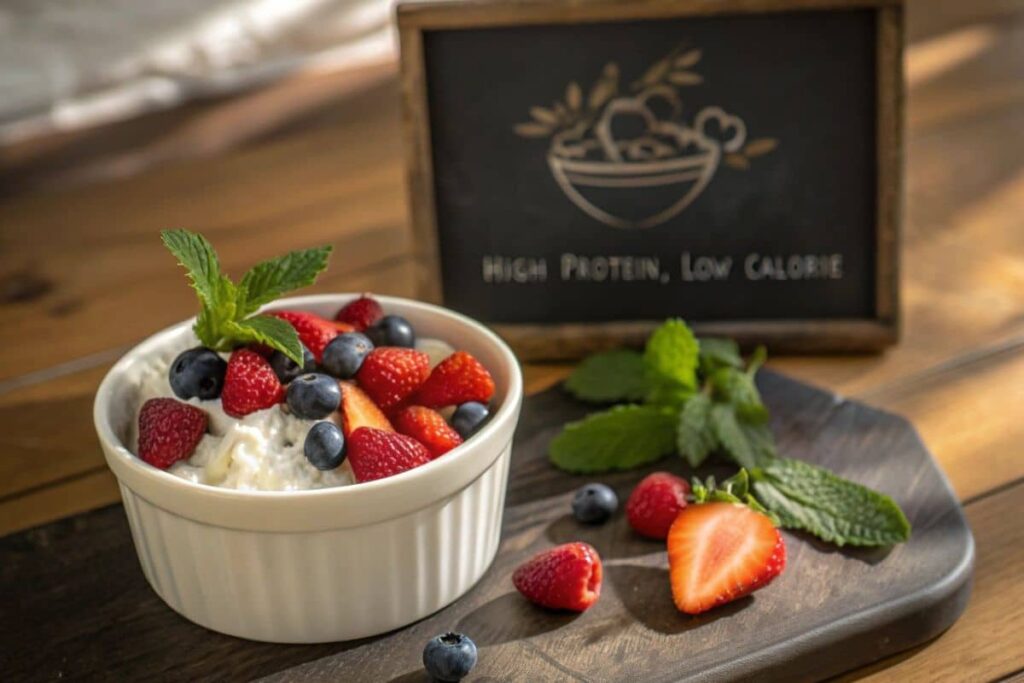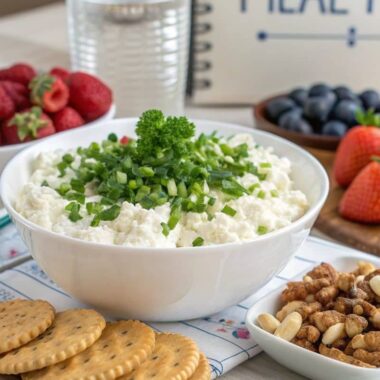Cottage Cheese Weight Loss: When it comes to weight loss, people often look for foods that are both nutritious and satisfying. But what about cottage cheese? Will eating cottage cheese every day help you lose weight? Known for its high protein and low calorie content, cottage cheese has become a popular choice among those aiming to shed extra pounds. In this article, we’ll explore how cottage cheese fits into a weight loss plan and whether it can deliver on its promises.
Table of Contents

Nutritional Profile of Cottage Cheese
Cottage cheese is often celebrated as a nutrient powerhouse, making it an excellent choice for weight loss and overall health. Let’s break down its nutritional composition to understand why it’s a go-to food for fitness enthusiasts and dieters alike.
High Protein Content
One of the best things about cottage cheese is its high protein content. A typical serving (100 grams) of low-fat cottage cheese has about 11–14 grams of protein, depending on the brand and fat level. Most of this protein is casein, which digests slowly. This slow digestion releases amino acids over time, helping to maintain and repair muscles. It also keeps you full for longer, making it a great option for reducing calorie intake.
- Why It Matters: Protein plays a critical role in weight loss by promoting satiety, preserving muscle mass, and boosting metabolism.
- Quick Fact: Consuming protein-rich foods like cottage cheese can help reduce hunger hormones like ghrelin, making you feel full longer.
Low in Calories
Cottage cheese is naturally low in calories, making it a diet-friendly food. A 100-gram serving of low-fat cottage cheese typically contains just 90–120 calories, depending on the fat content.
- Why It Matters: Foods with a low calorie density allow you to eat larger portions without consuming excessive calories, making it easier to maintain a calorie deficit—a key factor in weight loss.
Rich in Calcium and Bone-Supporting Nutrients
Cottage cheese is an excellent source of calcium, providing approximately 80–100 mg per 100 grams. Calcium not only supports bone health but may also aid in fat metabolism.
- Additional Nutrients: Cottage cheese is also rich in phosphorus, selenium, and B vitamins, all of which play essential roles in energy production, immunity, and overall well-being.
Low in Carbohydrates
For those following low-carb or ketogenic diets, cottage cheese is an ideal option. A standard serving contains just 3–4 grams of carbohydrates, making it suitable for low-carb meal plans.
Versatility in Fat Content
Cottage cheese comes in various fat levels:
- Low-Fat or Fat-Free: Ideal for calorie-conscious individuals.
- Full-Fat: Provides a richer taste and more satiety for those following higher-fat diets like keto.
Nutritional Summary Table
| Nutrient | Low-Fat (100g) | Full-Fat (100g) |
|---|---|---|
| Calories | 90–120 | 150–200 |
| Protein | 11–14 g | 12–15 g |
| Carbohydrates | 3–4 g | 4–5 g |
| Calcium | 80–100 mg | 90–110 mg |
Key Takeaway
Cottage cheese is a nutrient-rich, low-calorie food that can support weight loss efforts when included in a balanced diet. Its high protein content, combined with its versatility, makes it an excellent choice for those seeking to shed pounds while maintaining energy levels.
How Cottage Cheese Affects Weight Loss
Cottage cheese has several properties that make it an effective food for weight loss. From its ability to suppress hunger to supporting muscle preservation, this humble dairy product can be a game-changer in your diet. Let’s explore how it specifically aids weight management.
High Satiety Levels: Feeling Fuller for Longer
The protein content in cottage cheese plays a significant role in keeping you full for extended periods. This satiety can help curb unnecessary snacking and reduce overall calorie intake.
- Why Protein Matters for Satiety:
Protein slows down digestion and reduces the hunger hormone ghrelin while increasing satiety hormones like GLP-1 and peptide YY. - Practical Example: Replacing a high-carb breakfast (like pastries) with a bowl of cottage cheese and fruit can sustain your energy levels until lunchtime.
Promotes a Calorie Deficit
Cottage cheese is low in calories while still being nutrient-dense. Incorporating it into meals allows you to enjoy satisfying portions without exceeding your calorie budget.
- Calorie Density Advantage: Foods like cottage cheese, which have fewer calories per gram, let you eat more volume while maintaining a calorie deficit—a fundamental requirement for weight loss.
Muscle Preservation During Weight Loss
When losing weight, it’s common to lose both fat and muscle. However, protein-rich foods like cottage cheese help preserve lean muscle mass, which is crucial for maintaining a healthy metabolism.
- Why This Matters:
Lean muscle burns more calories than fat, even at rest. Preserving muscle during weight loss ensures that your metabolism stays active and efficient. - For Active Individuals: Combining cottage cheese with strength training can enhance muscle recovery and growth, further boosting fat-burning potential.
Enhances Fat Metabolism
The calcium in cottage cheese has been linked to improved fat metabolism. Studies suggest that higher calcium intake can encourage the body to burn more fat, especially in combination with regular exercise.
Low Glycemic Index (GI)
Cottage cheese has a low glycemic index, meaning it causes a slow and steady rise in blood sugar levels. This helps prevent energy crashes and reduces cravings for sugary, high-calorie snacks.
- Why It’s Important for Weight Loss:
Foods with a low GI help maintain stable blood sugar, reducing the likelihood of overeating or binge eating.
How Cottage Cheese Fits Into Common Diet Plans
- Low-Carb Diets:
With minimal carbohydrates, cottage-cheese is a perfect fit for ketogenic or other low-carb diets. It provides energy without spiking insulin levels. - High-Protein Diets:
A key component of many weight-loss plans, protein helps with appetite control, and cottage cheese delivers a substantial amount per serving. - Intermittent Fasting:
Cottage-cheese is an excellent post-fasting meal option, offering a balance of protein and essential nutrients without overwhelming your digestive system.
Key Takeaway
Cottage-cheese supports weight loss by reducing hunger, promoting a calorie deficit, and preserving muscle mass. Its versatility allows it to fit seamlessly into various dietary approaches, making it an invaluable ally in achieving your fitness goals.
How to Incorporate Cottage Cheese Into Your Diet
Cottage-cheese is not only a nutrient-packed food but also incredibly versatile, making it easy to include in your daily meals. Whether you enjoy it as a savory dish, a sweet treat, or a quick snack, there are countless ways to make cottage-cheese part of a balanced diet.

Start Your Day with a Protein-Packed Breakfast
Cottage-cheese can transform your breakfast into a high-protein meal that keeps you satisfied for hours.
- Sweet Option:
- Combine cottage-cheese with fresh fruits like berries, bananas, or pineapple.
- Add a drizzle of honey or a sprinkle of cinnamon for extra flavor.
- Savory Option:
- Spread cottage-cheese on whole-grain toast and top with avocado, sliced tomato, or a poached egg.
- Add a pinch of salt, pepper, or herbs like dill or chives for added taste.
Add It to Salads
Cottage-cheese can be a flavorful addition to salads, adding creaminess and extra protein.
- Ideas for Salads:
- Toss it with mixed greens, cherry tomatoes, cucumbers, and grilled chicken for a nutrient-dense lunch.
- Use it as a substitute for traditional salad dressings to cut down on calories.
Use It as a Healthy Snack
Snacking on cottage-cheese can help you avoid unhealthy junk food cravings. It pairs well with a variety of nutrient-rich ingredients.
- Quick Snacks:
- Pair cottage-cheese with whole-grain crackers or rice cakes.
- Use it as a dip for raw veggies like carrots, celery, or bell peppers.
- Add a handful of nuts or seeds for crunch and healthy fats.
Upgrade Your Lunch or Dinner

Cottage-cheese is an excellent addition to savory meals, adding flavor and protein without extra carbs.
- Stuffed Vegetables:
- Use cottage-cheese as a filling for bell peppers, zucchini boats, or mushrooms. Mix it with herbs and bake until tender.
- Pasta and Casseroles:
- Swap out ricotta or cream in recipes like lasagna or baked ziti with cottage-cheese for a lighter option.
Blend It into Smoothies
Cottage-cheese can be used in smoothies for a creamy texture and a protein boost.
- Smoothie Recipe Idea:
- Blend together cottage-cheese, frozen berries, spinach, almond milk, and a touch of vanilla for a nutritious, filling drink.
Experiment with Cottage Cheese Desserts
You can enjoy cottage-cheese as a dessert by sweetening it naturally.
- Ideas:
- Mix it with unsweetened cocoa powder and a touch of stevia for a healthy chocolate mousse.
- Layer it with granola and fruit for a cottage cheese parfait.
Tips for Incorporating Cottage Cheese Daily
- Choose the Right Type: Opt for low-fat or fat-free cottage cheese if you’re focusing on calorie control. For more flavor and satiety, go for full-fat versions in moderation.
- Portion Size Matters: Stick to 100–150 grams per serving to keep your calorie intake in check.
- Be Creative: Cottage-cheese’s neutral flavor makes it easy to adapt to sweet or savory dishes. Experiment to find what works best for you!
Potential Drawbacks of Eating Cottage Cheese Daily
While cottage-cheese offers numerous health benefits and is a valuable tool for weight loss, consuming it every day might not be ideal for everyone. Let’s explore the potential downsides and precautions to take when incorporating it into your diet.
High Sodium Content
Many varieties of cottage-cheese contain significant amounts of sodium, which can pose health risks for certain individuals.
- Why It Matters:
- Excess sodium intake can lead to water retention, bloating, and increased blood pressure.
- For those with hypertension or kidney issues, high-sodium foods should be consumed in moderation.
- Solution:
- Look for low-sodium or no-salt-added options in grocery stores.
- Balance sodium intake by pairing cottage-cheese with potassium-rich foods like bananas or spinach.
Lactose Content
Cottage-cheese is a dairy product and contains lactose, which can be problematic for people who are lactose intolerant.
- Symptoms to Watch For:
- Bloating, gas, or stomach discomfort after eating cottage-cheese could indicate lactose intolerance.
- Solution:
- Opt for lactose-free cottage-cheese brands.
- Consume in smaller portions to minimize discomfort.
Lack of Dietary Variety
Relying too heavily on cottage cheese may lead to a lack of dietary diversity, which is essential for optimal health.
- Why It’s Important:
- No single food provides all the nutrients your body needs. Over-consuming cottage-cheese might lead to deficiencies in fiber, essential fats, or other vitamins and minerals.
- Solution:
- Use cottage-cheese as part of a balanced diet that includes vegetables, fruits, whole grains, and lean proteins.
- Rotate cottage-cheese with other high-protein options like Greek yogurt, eggs, or tofu.
Potential Additives
Some cottage-cheese brands contain added sugars, artificial flavors, or stabilizers, which can reduce its health benefits.
- What to Look Out For:
- Check the ingredient label for unnecessary additives.
- Avoid flavored cottage-cheese with added sugars or syrups.
- Solution:
- Choose plain, minimally processed cottage-cheese, and add your own natural flavors, such as honey or fresh herbs.
Fat Content in Full-Fat Varieties
While full-fat cottage-cheese is satisfying and flavorful, it is higher in calories and saturated fat compared to low-fat or fat-free options.
- Why It Matters:
- For individuals focused on calorie control, regular consumption of full-fat cottage-cheese can make it harder to maintain a calorie deficit.
- Saturated fat, in excess, can contribute to cholesterol issues in some people.
- Solution:
- Reserve full-fat cottage-cheese for occasional use and opt for low-fat versions for daily consumption.
Balancing Cottage Cheese in Your Diet
To maximize its benefits while minimizing potential downsides:
- Rotate with Other Protein Sources: Incorporate a variety of high-protein foods like lean meats, legumes, or nuts.
- Control Portion Sizes: Stick to serving sizes of 100–150 grams to avoid excessive sodium or fat intake.
- Choose High-Quality Products: Opt for brands with clean labels and low sodium.
- Supplement with Fiber-Rich Foods: Pair cottage-cheese with fruits, vegetables, or whole grains to balance its low fiber content.
FAQs About Cottage Cheese and Weight Loss
Can eating cottage cheese every day help me lose weight?
Yes, cottage-cheese supports weight loss with its high protein and low calorie content. It helps curb hunger and preserve muscle mass, key factors in losing weight. For more ideas, explore cottage cheese recipes here.
What are the disadvantages of eating cottage cheese?
Disadvantages include high sodium, potential lactose intolerance, and low fiber content. Pairing it with fruits or veggies can balance your diet. Learn more about what to avoid in cottage cheese.
Which is better for weight loss: cottage cheese or Greek yogurt?
Both are great options, but Greek yogurt offers probiotics, while cottage-cheese provides a creamier texture. Dive deeper into the comparison .
How much cottage cheese should I eat daily?
A serving of 100–150 grams is ideal. Pair it with fiber-rich foods like fruits or nuts for a balanced snack. Get inspired with these cottage cheese recipes .
Can I eat cottage cheese at night?
Yes, its slow-digesting protein keeps you full and aids muscle repair while you sleep. Pair it with nuts or berries for an evening treat.
Conclusion: A Balanced Approach to Weight Loss
Cottage-cheese is a nutrient-packed, versatile food that can play a significant role in supporting weight loss. Its high protein content helps curb hunger and preserve muscle, while its low calorie density makes it a smart choice for maintaining a calorie deficit. Whether enjoyed as part of a hearty breakfast, a light snack, or a savory dinner, cottage cheese fits seamlessly into various meal plans.
However, like any food, moderation is key. Be mindful of its sodium content, and pair it with fiber-rich ingredients to create a balanced diet. For best results, combine cottage-cheese consumption with regular physical activity and other nutrient-dense foods.

Cottage Cheese Weight Loss Benefits
Ingredients
Cottage Cheese Variants
- 100 grams Low-fat cottage cheese Typical serving size with 90-120 calories and 11-14g of protein.
- 100 grams Full-fat cottage cheese Richer and more satiating, contains 150-200 calories and 12-15g of protein.
Additional Meal Components
- 1 cup Fresh fruits (e.g., berries, bananas, pineapple) Great for adding natural sweetness and fiber.
- 1 slice Whole-grain toast Base for savory toppings.
- 1 whole Avocado Healthy fat option for spreading.
- 1 egg Poached egg Addition for a protein-packed breakfast.
Instructions
Preparation
- Select your type of cottage cheese (low-fat or full-fat) based on your dietary goals.
- Pair cottage cheese with fresh fruits for a sweet breakfast or snack.
- Spread cottage cheese on whole-grain toast and top with sliced avocado and a poached egg for a savory option.
Salads and Snacks
- Toss cottage cheese with mixed greens, cherry tomatoes, and cucumbers for a nutrient-dense salad.
- Pair cottage cheese as a dip with raw vegetables or whole-grain crackers.
Dinner Options
- Use cottage cheese as a filling for stuffed vegetables or mix it into pasta casseroles.
- Blend cottage cheese into smoothies for an easy, nutrient-packed drink.





